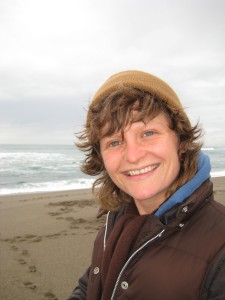This post is the first in a three-part series featuring Char Booth, the Director of Research, Teaching, and Learning Services at the Claremont Colleges Library in Claremont, CA. She works with faculty and students at the seven colleges to integrate information literacy concepts into coursework, often via Wikipedia assignments.

In academic circles and among advocates of the public sphere, there’s growing concern that information, even in the age of the Internet, is being bottled up. As The Economist notes, the circle of information access functions on a closed circuit: Academics write and submit (often) unpaid work, which is then sold back to university libraries in the form of journals, who pass them on to students and academics, who then draw on the information to create new research and writing… which is then submitted back to the academic journals.
The model has done well for some, but excludes those without university or corporate access — those that Char Booth describes as “information underprivileged.” In her work, and in this blog post on the topic, Booth describes the condition of “the institutionally unaffiliated and indefatigably curious.” Outside of open access resources, the work one can do, and the knowledge one can contribute, is severely restricted by limited access to the work others have done.
In other words, many people with much to contribute simply can’t.
Opening up
One of the exciting benefits of Wikipedia assignments in higher education is their vast potential for expanding the privilege of access to that information.
“Challenging information privilege is my core motivation for using Wikipedia in the classroom,” Booth says. “Teaching with Wikipedia helps students and faculty see that their access to resources and expertise carries with it a responsibility to the broader information ecology.”
In identifying and citing reliable sources of information, students, who have the privilege of access to paywalled information, are able to channel the work they make with that information into an open resource — democratizing access to their work and widening the public sphere. Those without that level of institutional privilege can then build on the work these students have done.
“We can engage learners to leverage paywalled library resources, empower participation in public discourse, and improve their powers of inquiry, evaluation, and attribution, all while creating a better Wikipedia,” Booth says.
Sparking Intrinsic Motivations for Learning
Expanding that information ecosystem has clear benefits for those outside of that system. It diversifies access to the knowledge needed for informed, active participation in the public sphere from those who lack the resources or desire to attend universities, or pay for access to academic journals: all tenets of the Open Access movement writ large. When students are aware that the work they are doing contributes to this expansion of information — and therefore, power — outside of their classroom, they often find it transcends a writing assignment and becomes a means of contributing to a greater social good.
“Creating content for the broader public, as opposed to solely for one’s professor, changes the game for students,” Booth said. “When students understand that their work will be accessible to anyone on the web, I find that it adds a measure of gravitas that sharpens focus and inspires greater diligence and responsibility.”
It also taps into an intrinsic motivators that drive student effort. Framed as means of expanding equal access to information, what would have been one of many forgotten papers in an academic career becomes real-world participation in the public sphere. It encourages learning, but also learning how to process and share their information. It becomes an active process, rather than a passive one.
“It’s empowering and interesting for students to participate in a different sort of platform, one that requires them to revise their concept of “audience” and the importance of their own voices in shaping discourse,” Booth said. “There’s a vulnerability in that, which any author can relate to — a sense of opening yourself to scrutiny and a need to understand all of the responsibilities that dynamic creates. And in terms of motivation, it’s much harder to half-ass when the world is watching.”
In part two, we look at how to frame a Wikipedia assignment within a classroom setting to connect the assignment to critical thinking on information privilege.
Char Booth blogs at info-mational and tweets @charbooth.
